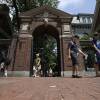Experience is a great teacher.
And as the reach of the opiate crisis continues, a local musician who made it big, is using his own battle with drugs to offer a unique take on addiction treatment.
Splashed across the brick exterior of a building off Arsenal Street in Watertown is a blue sign that reads “Right Turn”. It’s shaped like an arrow … pointing you to the front door.
Each year about 150 people - a growing number of them young adults in the grip of opiate addiction - cross this threshold into a space that looks more rock-n-roll than rehab. There’s a drum set, a row of electric guitars and - as you can hear - a keyboard.
At our request, Right Turn’s founder and CEO Woody Geissman is performing. The lyrics to the song he’s singing were written by patients … during group therapy.
“I wrote this nice little melody and I came in and I said we’re going to write a song about honest today.”
“I watched these people grab hold of that and use their own personal experience and really dig deep.”
Right Turn’s Watertown clinic is filled with flash: an autographed guitar, Elvis Presley images, a VIP pass to the Rolling Stones.
Framed black and white photos dominate the white walls of one room: Dan Zanes won a grammy for his children’s music and his brother just recently did the movie 20-feet to Stardom.
Geissmanwas the drummer. And he lived the rock n roll dream. The band rocketed out of Boston’s club scene and landed a recording contract with Warner Brothers. It was glorious and grueling. For Geissman it set the stage for addiction. Eventually, in a desperate effort to give up drugs, he also gave up music.
But his own recovery began only after hearing this advice:
Why would you leave your music behind you? Why would not embrace your creativity and embrace the part of you that wants to get well?
Geissman says creating music - and art - he’s also a painter - helped him get sober. As did a supportive counselor. Eventually, he became a licensed therapist and twelve years ago opened Right Turn. He supervises a staff of thirty-two clinicians. They offer traditional therapy, but patients are also encouraged to create art - anything from photographs to sculpture to a magic marker mural. And, of course, music.
Geissman says research confirms – what he sees daily - that art helps people connect with something deeply tied to addiction: emotion.
“The part of the brain that’s most affected by substance abuse disorder is that limbic system, the emotional brain,” says Woody Geissman “They can do 12-step recovery, they can talk to the psychiatrist, but what’s going to penetrate that is music and art.
And at Right Turn, the arts help keep patients connected. Every Saturday night the performance space here becomes night club - sober, but not somber.
On stage this night, Jon Cohan’s band. He’s the drummer.
By day he an addictions counselor. And, like many of the people on stage and in the audience, a recovering addict.
Jon Cohan, an addictions counselor says “Recovery is about taking in relationships and creating strong bonds between other people, and re-embracing, re-embracing life.
These Saturday night shows are open to everyone, but aimed at Right Turn’s patients. The longer they stay in recovery, the greater their chances of success. Nationally, addicts last – on average – about one month in treatment. At Right Turn, the average patient stays connected for three years.
The music and the community around it are all part of an effort to provide something that can rival the power of drugs – a good time.




